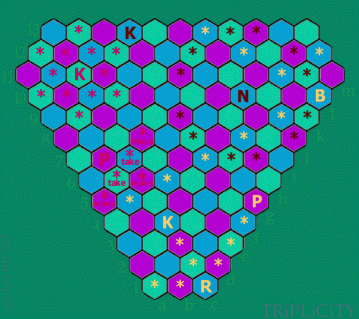TRiPLiCiTY
Invented by DavidTJagger (April 2005)
Authored by DavidTJagger
Copyright DavidTJagger 2005
TRiPLiCiTY
Triplicity is a simple but fascinating, 3-handed, 20-a-side chess variant played on a snub triangle board of 111 hexagons, strongly themed on the number 10. The game features the exaction of tribute and also the dropping of paid-for reinforcements onto the board's perimeter. The object of the game is to have your own king survive after all your opponents' kings have been vanquished.Board
The number of board hexagons, 111, is the sum of the first 3 powers of 10, divided by 10.

Start position
Each player begins the game with 10 pawns and 10 pieces and also 10 tribute tokens (white 'go' counters are ideal).

PLAY
Play begins with white and moves anti-clockwise to black, then red, then round to white again.Moves and Captures
Moves and Captures are as for Glinski's hexagonal chess, except for pawns. These move one bishop's step in one of the 3 forward 'bishop' directions (never 2 steps), and capture by one rook's step in one of the 2 forward 'rook' directions. They promote on any cell of the 'rank' furthest away from their king's home 'rank' and can promote to any piece not a pawn (whether or not previously captured), including a king! There is no 'en passant' nor 'castling'.The moves for the white rook, white bishop, black knight, red pawn and red king are illustrated below. A queen would move as either bishop or rook.

Tribute
The paying and receiving of Tribute is a very simple but major feature of the game. The pieces have these fixed values: Pawns are worth 1 tribute token, Knights and Bishops 2, Rooks 3, Queens 4, Kings 5.Tribute is paid after a capture and works like this: If player A captures player B's man, then player C must immediately (on A's same turn) pay player A the value of the captured man.
So if A took B's rook, C would immediately have to pay 3 tribute tokens to A.
If C hasn't enough tribute tokens left to pay out in full, he merely pays out to A all those tokens he has left. If he can afford to pay nothing whatever (i.e he has no tokens at all), he must sacrifice one of his own men (of his own choice) to the gods - i.e remove it from play, even if he thus puts himself into danger, but he is never allowed to sacrifice his last king, even if that is his last remaining piece.
All tribute tokens that a player possesses should remain at all times clearly visible to all players.
When one player is vanquished or resigns
Once a game has reduced to 2 players through one player being vanquished (rather than resigning), tribute payment to a capturer by the uninvolved party no longer applies. The last tribute paid in such a game would always be that for the captured last king (worth 5 tokens) of the vanquished player.Any pieces that remain of the first side whose final king has been vanquished stay in situ, immobile and powerless. They can be captured by either surviving side - but no tribute is then exacted.
Any tribute tokens that the vanquished side possess pass into the hands of the player who captured that side's final king.
However, if a player resigns a game without being finally vanquished, no king is removed. His whole army remains on the board in situ - frozen - though still liable to capture by either surviving side. In this case tribute still applies, but only for the capture of a resigned player's king - when the uninvolved player would be liable to (try to) pay the capturer 5 tribute tokens.
The player who captures the resigning player's last remaining king, inherits the hoard of that player's tribute tokens, if any.
Reinforcements
Using the same value system, tribute tokens can be used to buy extra men of any kind (including further kings!), one at a time.As a whole turn, a player can opt to buy another man for his army, and place it on any empty cell around the perimeter of the board. Pawns, however, may not be dropped directly onto any of their promotion cells.
In buying a man, a player must pay the full value of the man firstly to the gods (i.e by removing a sum of his tribute tokens to that value from play competely) and then also pay the same full value in tokens to each of the other remaining players.
So, if all 3 players still remain and a player for his turn decides to buy and place a knight (or a bishop), it would cost him 6 tokens in total, 2 to the gods, and 2 to each of the other 2 players.
If only 2 players are left the costs are relatively less. Then a player buying a queen would have to fork out 8 tokens in all, 4 to the gods and 4 to the single other player, rather than the 12 in total he would have had to pay if all 3 players had still been in the game.
Buying a pawn (being a cheap 3 tokens at most) is quite common. Buying a king (a mininum of 10, a maximum of 15 tokens) is a decided luxury.
You must drop a piece on the same go that you pay for it. You cannot pay for or drop more than one man at a time.
As with promotion, the choice of pieces need NOT be restricted to pieces already taken.
No Check
Check or Checkmate are not significant terms in TRiPLiCiTY. Only actual captures matter. A king is fully alive and free until actually captured and removed from the board. Kings can freely move into, within or out of conventional 'check' or even 'mate'.For in TRiPLiCiTY situations arise when a player cannot capitalise on a threat to an opponent's king because his own king is in immediate danger from the third player. So kings can approach and even capture other kings or pieces that threaten them.
Rule of Jeopardy
Triplicity has a special rule to ensure 3-handed continuance where possible. Namely: It is illegal to take another player's king if your own king would then be in immediate jeopary from a third player, i.e if it could then be captured immediately by the third player.Ring of Jeopardy
Each side's king could be in jeopardy, forming a ring of jeopardy - i.e. A threatens B's king, while B threatens C's king, while C threatens A's king - so none could then take another's king. However, the game is by no means frozen, because (as stated earlier) kings are free to move even under threat and the situation is soon likely to resolve itself. I mention it only as a curiosity.Winner takes all
In Triplicity, there is no kudos in coming second. Both first and second players to fall score zilch, the sole survivor taking all the points.Conferring
The players are free to chose whether or not conferring is permitted. If it is allowed, it should be done openly (over the board) and not secretly. If one side is dominating, the other two need to work in concert - whether in conference or not - if they are to redress the imbalance.I take it all back
In the spirit of the 10 theme and in order to unlock more of the beauty of the game, a player in the course of the game is allowed to retract up to 10 of his moves! He might even choose to retract his move 10 times on the same go! He must, however, choose to retract a move before his next go!Haven't you moved yet
Depending on the occasion, and again following the 10 theme, a time limit for individual moves could be set at 10 minutes or some multiple thereof.Solitair
The game makes a good solitaire too.Enjoy!
Variants
Not much I see to alter or vary really. Of course, a similar game might be tried on other 3-handed boards with other pieces.You might wish to try allowing reinforcement drops anywhere on the board, but I suspect this would lead to over-rapid games, with a reduction in clarity.
The 'Rule of Jeopardy' situation (where a player is forbidden to take another's last king if his own last king is about to fall) I find has been elsewhere differently resolved. For instance, two (last) king captures, one after the other, might be prohibited - a rule that protects a king-taker's own vulnerable king. That could be tried instead, but to my mind this too easily relinquishes the joy in the difference of a 3-hander. My goal, at least, was to have all 3 players contributing to the game for as long as possible.
Background
Motive
Successful 3-handed chess games are notoriously difficult to design. To quote Tom Braunlich in his entry 'Designing a Variant' from from D.B. Pritchard's 'The Encyclopedia of Chess Variants': ".... Attacks tend to benefit the uninvolved player. Within the games industry, this problem is considered to be the main reason why multiplayer games have never been commercially successful despite dozens of clever attempts. .... The first inventor to solve this problem in an elegant way, and without excess of new rules, will be the first to succeed with this natural idea." This competiton seemed a good opportunity to rise to the bait!Design
The number (111) came first, then the board, then (after experiments with a few others) the pawn move (which I preferred for its clarity), then the idea of tribute (which is an ancient usage in warring times and looks like an attempt to solve much the same problem), then that of reinforcement drops (shogi-inspired though rather different and more restrained), then the conceptualisation in detail of the tribute mechanism (which had quickly to be modified to include the gods' portion when paying for reinforcements - to prevent the original hoard of 30 tokens potentially circulating forever), then the playtesting (always surprising and thoroughly enjoyable) where I slightly modified the starting array, then finally the finished product, which I hope you enjoy.Name
The 3 i's within TRiPLiCiTY are meant to represent the contending 3 egos. Converted to 1's, they can also refer to the number of hexagons of the board. Beyond that, the name is hopefully suggestive not just of double but of triple dealing, and also too of the concourse of a triple city (or perhaps a state of three rival cities), which is the battleground itself.Strategy
The game tests your political and diplomatic skills in manners unknown to a 2-handed chess. You need to judge very finely just how much you can afford to hurt an opponent, so he still remains capable of combining with you against the third player (and won't just react spitefully). Or should you go in for the instant kill? When is it best to remain quiet, when to spring into action? How should you invest your usually very limited funds? Should you wait until only 2 players are left in the hope of cheaper reinforcements? Will you still be one of them? How can you cooperate with a second to nullify a third players advantage? How far can you trust that a player you want to work with will be able to see where his own best interests lie? When your funds are low, how can you make a quick capture to stave off having to sacrifice a man? Where can you best place a pawn (or should that be a knight) to irritate the opposition, and how do you cope with that pesky pawn just dropped near your king?Influences
Glinski figures large for the pieces and most of the moves, and the game of shogi for the idea of a drop. The pawn move and capture, I suspect, has been used before. The tribute idea is unlikely to be original, though I am not consciously aware of anything similar. If anyone knows of anything close to this game please let me know in a comment. Thanks.Anyone is welcome to try to make a Courier set or Zillions game for Triplicity.
Happy Anniversary!
Adios
DTJ
Written by David Jagger.
WWW page created: May 7, 2005.
